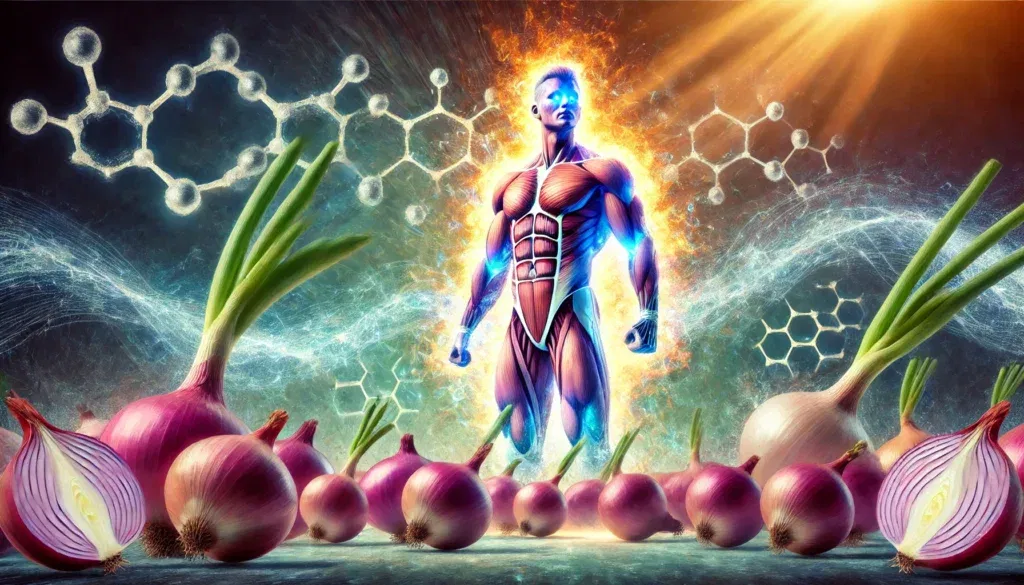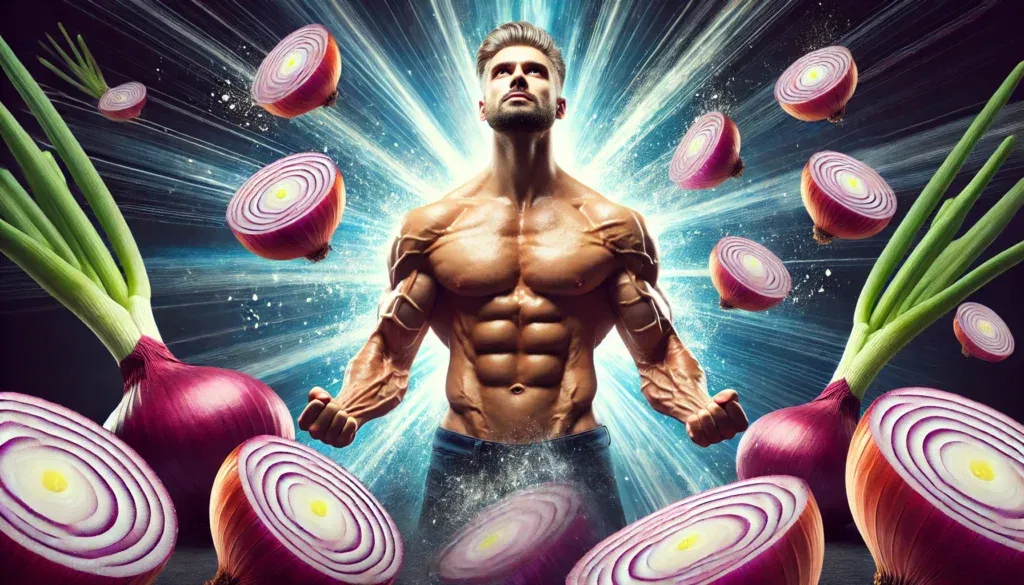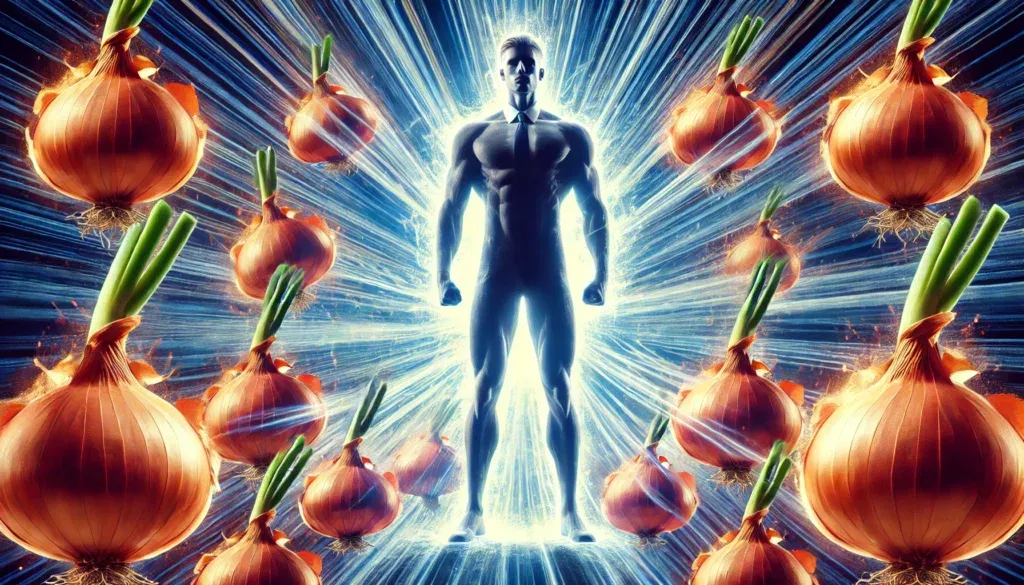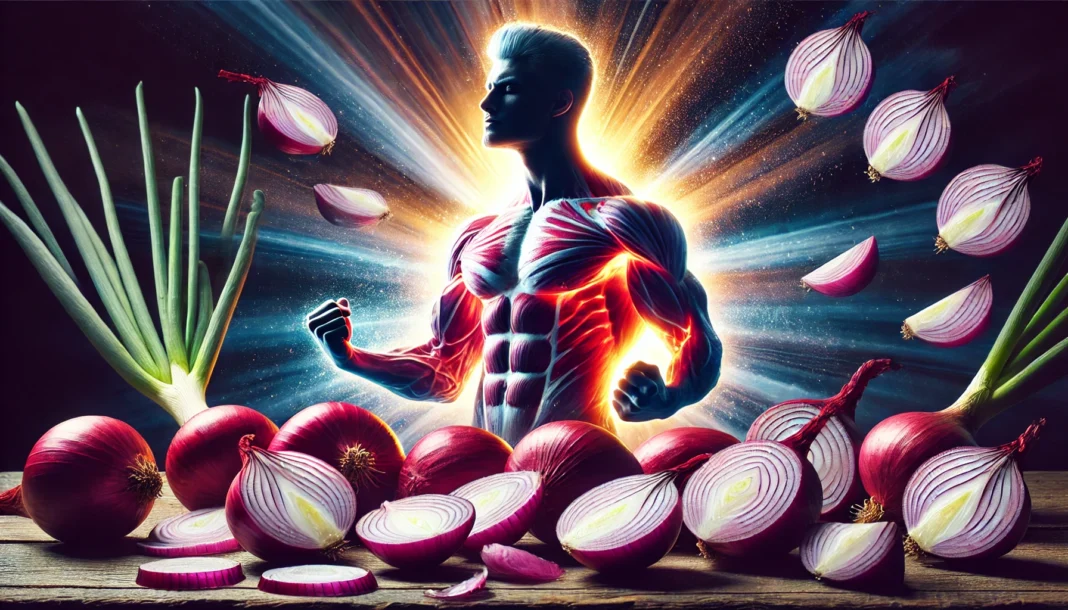The connection between nutrition and hormone balance is a topic of increasing interest, particularly among men looking to optimize testosterone levels naturally. In the search for dietary strategies that support hormonal health, one food that often comes into the conversation is the onion—particularly in its raw form. Proponents claim that consuming raw onions can boost testosterone, but what does the scientific evidence say? Are these claims backed by rigorous research, or are they just another myth circulating in the health and wellness community? In this article, we will explore the relationship between onions and testosterone, analyze the available scientific studies, and determine whether adding raw onions to your diet can significantly influence testosterone production.
You may also like: How to Increase Testosterone Levels Naturally: Science-Backed Strategies for Men’s Health & Longevity
The Science of Testosterone and Its Importance for Men’s Health
Testosterone is the primary male sex hormone, responsible for a range of physiological functions that extend beyond just reproductive health. It plays a crucial role in muscle growth, bone density, fat metabolism, mood regulation, and even cognitive function. While women also produce testosterone, men typically have significantly higher levels, making it an essential hormone for overall well-being.
As men age, testosterone levels naturally decline, leading to symptoms such as reduced muscle mass, increased body fat, decreased libido, and cognitive fog. The decline in testosterone can be exacerbated by poor lifestyle choices, such as an unhealthy diet, lack of exercise, chronic stress, and insufficient sleep. Consequently, there is a strong interest in natural ways to sustain or boost testosterone, leading many to explore dietary interventions, including the consumption of raw onions.

Understanding the Nutritional Composition of Onions
Onions (Allium cepa) are a staple ingredient in many cuisines worldwide and are known for their strong aroma and pungent taste, particularly when eaten raw. They are rich in bioactive compounds, including flavonoids, sulfur-containing compounds, and antioxidants. Among these, quercetin, a powerful flavonoid found in onions, has been studied for its potential health benefits, including anti-inflammatory and antioxidant properties.
Additionally, onions contain essential minerals such as selenium and zinc, both of which are crucial for testosterone production. Zinc, in particular, has been extensively researched for its role in maintaining healthy testosterone levels. A deficiency in zinc has been linked to reduced testosterone production, making it an important dietary component for men aiming to optimize their hormone levels.
The Link Between Onions and Testosterone: What Research Says
Scientific interest in the potential testosterone-boosting effects of onions has led to several studies, primarily conducted on animals. These studies have provided intriguing insights into the possible hormonal benefits of onion consumption.
One of the most well-known studies was conducted on rats, where researchers found that administering onion juice led to significant increases in testosterone levels. The proposed mechanism behind this effect is that onions enhance luteinizing hormone (LH) secretion, which signals the testes to produce more testosterone. Additionally, onions contain antioxidants that may help protect Leydig cells (the cells responsible for testosterone production) from oxidative damage, thereby enhancing their ability to synthesize testosterone efficiently.
However, while these findings are promising, it is important to note that animal studies do not always translate directly to human physiology. There is still a lack of large-scale, well-controlled human studies that conclusively demonstrate that consuming raw onions leads to a substantial increase in testosterone levels in men. While anecdotal evidence and preliminary research suggest a potential benefit, more rigorous scientific validation is needed.
How Raw Onions May Support Hormonal Health
Despite the limited human research, there are several plausible mechanisms through which raw onions could support testosterone production and overall hormonal health.
- Antioxidant Properties: Onions are rich in antioxidants, particularly quercetin, which helps reduce oxidative stress. Since oxidative stress has been linked to testosterone decline, consuming foods high in antioxidants may indirectly support testosterone production by reducing cellular damage in the testes.
- Improving Circulation: Onions contain sulfur compounds that help improve blood circulation. Enhanced circulation can support the delivery of essential nutrients to the testes, which may facilitate testosterone synthesis.
- Enhancing Zinc Absorption: Onions contain prebiotic fibers that support gut health, which is essential for nutrient absorption. Since zinc is a key mineral for testosterone production, improving gut health could enhance zinc absorption, thereby supporting hormonal balance.
Comparing Onions to Other Natural Testosterone Boosters
Onions are not the only food believed to have a positive impact on testosterone levels. Other foods commonly associated with testosterone production include:
- Garlic: Garlic has been studied for its ability to increase testosterone levels through its active compound, allicin. Some research suggests that garlic supplementation can enhance testicular function and reduce cortisol levels, which may help sustain testosterone levels.
- Eggs: Rich in healthy fats and cholesterol, eggs provide the building blocks necessary for testosterone synthesis.
- Oysters: Oysters are one of the richest natural sources of zinc, making them a well-known food for boosting testosterone levels.
- Leafy Greens: Vegetables like spinach and kale contain magnesium, which has been linked to increased free testosterone levels.
While raw onions may offer some testosterone-supporting benefits, they should be considered as part of a balanced diet rather than a standalone solution for boosting testosterone levels.
Practical Ways to Incorporate Raw Onions into Your Diet
For those who want to experiment with raw onions as a potential natural testosterone booster, there are several ways to include them in your daily diet:
- Add raw onions to salads: Sliced or diced onions can add a crunchy, flavorful element to fresh salads.
- Include onions in sandwiches and wraps: Layering thinly sliced onions in sandwiches or wraps can enhance taste and nutritional value.
- Consume onion juice: While not the most palatable option, some people blend onions into juice for a concentrated intake of bioactive compounds.
- Use onions in salsa or guacamole: Finely chopped onions can be mixed into fresh salsa or guacamole for a flavorful boost.
- Pair with protein sources: Combining onions with protein-rich foods like grilled meat, eggs, or legumes can create a balanced meal that supports overall health.

Frequently Asked Questions (FAQ) on Raw Onions and Testosterone
1. Does raw onion increase testosterone levels naturally?
Yes, raw onions have been studied for their potential role in boosting testosterone levels naturally. Onions contain quercetin, a powerful antioxidant that may help reduce oxidative stress in the testes, leading to improved hormone production. Additionally, raw onions are rich in sulfur compounds and flavonoids, which have been linked to increased luteinizing hormone levels—a key regulator of testosterone production. While some animal studies have shown promising results, more human research is needed to confirm the direct impact of raw onions on testosterone levels. However, including raw onions in a balanced diet alongside other testosterone-supporting foods may contribute to overall hormonal health.
2. How does garlic affect testosterone levels compared to onions?
Garlic has been linked to increased testosterone production through a different mechanism than onions. The active compound in garlic, allicin, is known for its ability to lower cortisol levels, a stress hormone that can negatively impact testosterone production. Unlike raw onions, which contain quercetin and sulfur compounds, garlic primarily works by reducing stress-induced testosterone suppression. Some studies suggest that combining garlic and onions in a diet may create a synergistic effect, potentially enhancing testosterone levels more than consuming either alone. However, further clinical trials are needed to establish their effectiveness in humans conclusively.
3. Does eating raw onions increase testosterone more than cooked onions?
Yes, eating raw onions may have a stronger effect on testosterone levels compared to cooked onions. Cooking can degrade some of the bioactive compounds found in onions, particularly quercetin and sulfur-containing compounds that support hormone production. Raw onions maintain a higher concentration of these beneficial compounds, which may contribute to their potential testosterone-boosting effects. However, for those who find raw onions difficult to digest, lightly cooking them while preserving some of their nutrients can still provide health benefits. The key is to consume onions in a way that suits your dietary preferences while ensuring optimal nutrient retention.
4. Can onions alone significantly boost testosterone levels?
While raw onions testosterone benefits are promising, they are unlikely to be a standalone solution for significantly boosting testosterone. Testosterone production is influenced by multiple factors, including diet, exercise, sleep, and stress management. Incorporating onions into a nutrient-dense diet alongside protein, healthy fats, and other micronutrients essential for hormone production will yield better results. Additionally, regular physical activity, particularly resistance training, plays a crucial role in maintaining healthy testosterone levels. Rather than relying solely on onions, a holistic approach is recommended for optimal hormonal balance.
5. How often should I eat raw onions to support testosterone levels?
There is no definitive guideline on how frequently raw onions should be consumed to boost testosterone. However, studies on animal models have suggested beneficial effects when onions are included daily in moderate amounts. A practical approach is to incorporate raw onions into salads, sandwiches, or dressings several times per week. Consuming a variety of testosterone-supporting foods, including onions, garlic, eggs, and leafy greens, will help maintain a balanced nutrient intake. As with any dietary change, it’s important to monitor how your body responds and adjust accordingly.
6. Are there any side effects of consuming too many raw onions for testosterone?
While raw onions offer several health benefits, excessive consumption can cause digestive discomfort in some individuals. Common side effects include bloating, gas, and acid reflux, especially when eaten in large quantities. Additionally, onions contain natural sugars known as fructans, which may lead to digestive distress in individuals with irritable bowel syndrome (IBS). To maximize raw onions testosterone benefits without discomfort, start with small amounts and gradually increase intake based on tolerance. If digestive issues persist, consider consuming cooked onions, which are often easier to digest.
7. Does onions boost testosterone more effectively when combined with other foods?
Yes, the testosterone-boosting effects of onions can be enhanced when combined with other nutrient-rich foods. Foods high in zinc, vitamin D, and healthy fats, such as eggs, fatty fish, and nuts, play a critical role in testosterone production. Additionally, combining onions with garlic may create a complementary effect, as garlic reduces cortisol levels while onions support testosterone synthesis. A well-balanced diet that includes diverse sources of vitamins, minerals, and antioxidants will provide the best support for maintaining optimal testosterone levels.
8. Can onion supplements provide the same testosterone benefits as raw onions?
Onion supplements, often marketed as onion extract or quercetin capsules, may provide some of the beneficial compounds found in raw onions. However, whole foods contain a complex matrix of nutrients that work synergistically, which is difficult to replicate in supplement form. While some supplements claim to support testosterone levels, their effectiveness can vary based on dosage, quality, and absorption rates. For the most reliable benefits, consuming whole, fresh onions in a balanced diet is recommended over relying solely on supplements.
9. Does onions increase testosterone in older men?
As men age, natural testosterone levels decline, making dietary interventions particularly important for maintaining hormonal balance. While onions contain compounds that may support testosterone production, their effects in older men remain less studied. Lifestyle factors such as maintaining a healthy weight, staying physically active, and consuming a nutrient-rich diet will have a more profound impact on testosterone levels than onions alone. However, incorporating onions as part of an overall hormone-supportive diet can be beneficial in promoting long-term health and well-being.
10. How does raw onions testosterone benefits compare to pharmaceutical testosterone boosters?
Raw onions provide a natural way to support testosterone levels, but they do not function in the same way as pharmaceutical testosterone boosters. Prescription testosterone therapy directly increases hormone levels in the bloodstream, whereas dietary approaches aim to optimize the body’s natural production. While onions may offer a mild boost in testosterone-related health, they are not a substitute for medical treatment in individuals with clinically low testosterone. Anyone considering testosterone therapy should consult a healthcare professional to determine the most appropriate course of action for their specific needs.

Final Thoughts on Onions and Testosterone
The idea that raw onions can increase testosterone is an intriguing one, backed by some preliminary research and plausible biological mechanisms. The antioxidant properties, potential influence on luteinizing hormone, and ability to enhance nutrient absorption all suggest that onions could support hormonal health to some extent. However, until more human studies provide concrete evidence, onions should be viewed as a complementary part of a testosterone-friendly diet rather than a miracle food for hormone optimization.
If you are looking to maintain healthy testosterone levels, it is essential to adopt a holistic approach that includes a well-balanced diet, regular exercise, quality sleep, and stress management. While incorporating raw onions may offer some benefits, it should be done in conjunction with other scientifically supported strategies for optimizing testosterone levels.
natural ways to boost testosterone, onion health benefits, testosterone-boosting foods, best diet for men’s hormones, raw onions and hormone balance, increase testosterone naturally, antioxidants for testosterone, men’s health nutrition, luteinizing hormone stimulation, foods that improve circulation,onion testosterone benefits, does garlic boost testosterone, natural hormone support, zinc-rich foods for men, raw onion testosterone effects, best foods for male hormones, testosterone-friendly diet, improving testosterone levels naturally, quercetin and testosterone, sulfur compounds for hormone health
Further Reading:
Testosterone in Males as Enhanced by Onion (Allium Cepa L.)
Testosterone in Males as Enhanced by Onion (Allium Cepa L.)
Is There a Best Time to Eat Onions?
Disclaimer: The information provided in this article is for general informational purposes only. The content does not constitute professional advice of any kind, including but not limited to medical, legal, or financial advice. HisHealthMag and its contributors make no representations or warranties regarding the accuracy, completeness, or reliability of the information presented. Always seek the advice of a qualified professional for any specific concerns or questions you may have. Neither HisHealthMag nor its authors assume any responsibility or liability for any actions taken based on the information provided in this article. The views and opinions expressed are those of the author(s) and do not necessarily reflect the official policy or position of HisHealthMag.





